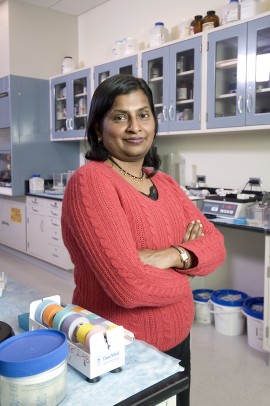Finding new ways to fill tooth cavities
The Researcher of the Year award recognizes 10 UIC scientists who are advancing knowledge in their fields. The Distinguished Researcher Award honors five researchers with a record of outstanding achievement. The Rising Star Award honors early career researchers who show promise as future leaders.
Anne George’s research could one day bring a new way of filling dental cavities.
George, professor of oral biology and Allan G. Brodie endowed professor in the College of Dentistry, is studying how proteins can regenerate dentin, a calcified tissue of the body that is one of the four major components of teeth.
George has been instrumental in cloning the dentin matrix protein genes from animal models. Her studies are directly aimed at dentin mineralization because of its uniformity and metabolic simplicity relative to bone.
Dentists today traditionally use amalgam or other artificial compounds to fill cavities. Instead, George said, dentists can fill the cavity with the dentin matrix protein 1, which binds calcium. After covering the site with polymer resin, new tissue would grow within a few weeks, allowing the dentin to regenerate.
The dentin matrix protein 1 gene cannot only regenerate dentin, — it can be used as a signaling molecule that converts stem cells into osteoblasts to help repair bone fractures more quickly.
George is interested in the science of biomimetics (the study of biological systems as models for machines) and tissue engineering, areas she calls “fascinating.”
“Understanding nature’s design principles and ultimately mimicking the process may provide new approaches to synthesize biomaterials with unique properties for various applications,” she said.
George’s laboratory focuses on protein-based scaffolds, naturally derived biomaterial scaffolds that provide cell-interacting elements.
George hopes such research will lead to the repair and regeneration of bone and teeth.

